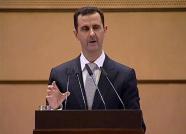
Syrian President Bashar Assad vowed Tuesday to respond to threats against him with an “iron hand” and refused to step down, insisting he still has his people’s support despite the 10-month-old uprising against him.
In his first speech since June, Assad repeated claims that a foreign conspiracy and terrorists are behind the unrest — not true reform-seekers.
“Our priority now is to regain security which we basked in for decades, and this can only be achieved by hitting the terrorists with an iron hand,” Assad said in a nearly two-hour speech at Damascus University, where he stood at a podium flanked by Syrian flags. “We will not be lenient with those who work with outsiders against the country.”
Assad also lashed out at the Arab League, saying the Cairo-based bloc failed to protect Arab interests. The League has suspended Syria and sent a team of monitors to assess whether the regime is abiding by an Arab-brokered peace plan that Assad agreed to on Dec. 19. The moves were humiliating for Syria, which considers itself a powerhouse of Arab nationalism.
“The Arab League failed for six decades to protect Arab interests,” Assad said. “We shouldn’t be surprised it’s failed today.”
Kuwait’s official news reported that a group of Arab League observers were attacked in the northern city of Latakia on Monday and two Kuwaiti army officers were lightly injured. KUNA news agency said the observers were attacked by “unknown protesters” on Monday. Online footage posted by activists online showed what appears to be a white Arab League vehicle swarmed by pro-Assad protesters in Latakia, some of them dancing on top of the car.
The president has made only four public speeches since the anti-government uprising began in March, inspired by the revolutions sweeping the Arab world. The regime’s crackdown on dissent has killed thousands and led to international isolation and sanctions.
Tuesday’s speech differed little from his previous appearances, in that Assad struck a more defiant tone and reiterated claims of conspiracy and promises of reform.
Rime Allaf, an associate fellow at London’s Chatham House, said the speech was “a pretense of strength” while distributing blame for Syria’s problems on everyone else.
“His excessive discussion of details on so-called reforms, followed by details on the so-called conspiracy, is a desperate attempt to convince Syrians that the regime will survive what it describes as a crisis,” she said. “He hopes revolutionaries — who he equated with terrorists during the entire speech — will simply give up and go home,” Allaf added.
Assad, 46, inherited power 11 years ago from his father and has adopted tactics similar to those of other autocratic leaders in the region who scrambled to put down popular uprisings by offering claims of conspiracy while unleashing a crackdown on their people.
The formula failed in Tunisia and Egypt, where popular demands increased almost daily — until people accepted nothing less than the ouster of the regime. But Syria’s conflict has gone on far longer, and the death toll is mounting daily.
“We will declare victory soon,” Assad said. “When I leave this post, it will be also based upon the people’s wishes,” he added.
Regime opponents denounced the speech.
“The speech didn’t bring anything new that could end the crisis and its repercussions,” said Hassan Abdul-Azim, a prominent opposition figure in Syria.
“Assad talked once again about foreign conspiracy and that the Arab League is a cover for a foreign intervention without pointing out that the Arab League wants, through its plan, to protect the Syrian people,” he said.
A Syria-based activist was dismayed at what he said was a rambling speech.
“Bashar is completely removed from reality, as if he is talking about a country other than Syria,” said the man who identified himself by his nickname, Abu Hamza, because of fear of reprisals.
Also Tuesday, Assad also accused hundreds of media outlets of working against Syria and claimed an interview he gave to Barbara Walters at ABC news network last month was altered and accused the station of “professional fabrication.”
“They failed, but they have not given up,” he said of media outlets in the speech, which was broadcast live on state television.
Since the start of the uprising, Assad has blamed a conspiracy and media fabrications for the unrest — allegations that the opposition and most observers dismiss. The regime has banned most foreign news outlets and prevented independent reporting.
In recent months, Syria’s conflict has turned increasingly violent as army defectors turn their weapons on the regime and some protesters take up arms to protect themselves.
Syria agreed in December to an Arab League-brokered plan that calls for an end to the military crackdown on protesters, but killings have continued.
About 165 Arab League monitors are in Syria to determine whether the regime is abiding by the plan to stop violence and pull heavy weapons out of the cities.
The U.N. estimated several weeks ago that more than 5,000 people have been killed since March. Since that report, opposition activists say hundreds more have died.
Adnan al-Khudeir, head of the Cairo operations room that the monitors report to, said more observers will head to Syria in the coming days and the delegation should reach 200. He said the mission then will expand its work in Syria to reach the eastern province of Deir el-Zour and predominantly Kurdish areas to the northeast.
Assad also said he was implementing reforms and that a referendum on a new constitution should be held in March. As it stands now, the constitution enshrines his Baath party as the leader of the state.
But Assad emphasized the measures are not coming because of pressure from the crisis.
“If reform is forced, it will fail,” he said. “Reform for us is the natural path.”
AP

Leave a Reply
You must be logged in to post a comment.